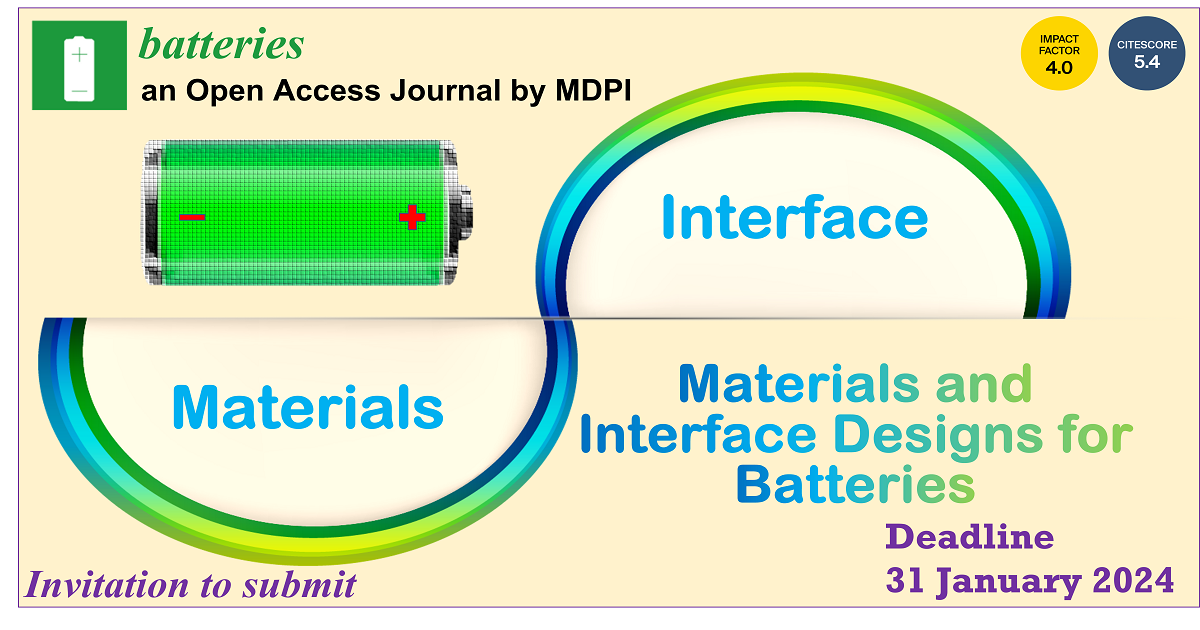Materials and Interface Designs for Batteries
A special issue of Batteries (ISSN 2313-0105). This special issue belongs to the section "Battery Materials and Interfaces: Anode, Cathode, Separators and Electrolytes or Others".
Deadline for manuscript submissions: closed (31 January 2024) | Viewed by 29814

Special Issue Editors
Interests: preparation and application of energy materials
Interests: battery materials (Li/Na/K ion batteries, et al.); physical chemistry of metallurgy; hydrometallurgy; comprehensive utilization of metallurgical resources
Interests: design, preparation, structural characterization and application of new energy materials (aqueous or non-aqueous lithium/sodium/potassium/zinc ion batteries, zinc-air batteries); hydrometallurgy and recycling of solid waste resources
Interests: energy material; nanomaterial; catalytic material
Special Issues, Collections and Topics in MDPI journals
Special Issue Information
Dear Colleagues,
This Special Issue is focused on “Materials and Interface Designs for Batteries”. Electrode materials and their interface with electrolytes significantly determine the performance of batteries. The electrode material design of batteries is not only about the size and morphology of the materials, but also about the chemical bond strength, atomic migration, structural change, and volume expansion. Interface design mainly includes the regulation of electronic properties (band structure, state density) and ionic properties (ion migration). In general, understanding the structure and interface evolution of electrodes at the molecular level, rational design and regulation of the structure, and interface of electrochemical energy materials are the basis for significantly improving the performance of batteries.
Potential topics include but are not limited to:
- Li/Na/K/Zn-ion batteries;
- Li/Na/K/Zn metal batteries;
- Li/Na/K/Zn-Air batteries;
- Li/Na/K-S batteries;
- Cathode, anode, and electrolytes;
- All-solid-state battery and quasi-solid-state battery;
- Novel battery systems;
- Electrochemical test method.
Dr. Yuanhua Xiao
Prof. Dr. Ling Wu
Prof. Dr. Xianwen Wu
Prof. Dr. Yiping Tang
Guest Editors
Manuscript Submission Information
Manuscripts should be submitted online at www.mdpi.com by registering and logging in to this website. Once you are registered, click here to go to the submission form. Manuscripts can be submitted until the deadline. All submissions that pass pre-check are peer-reviewed. Accepted papers will be published continuously in the journal (as soon as accepted) and will be listed together on the special issue website. Research articles, review articles as well as short communications are invited. For planned papers, a title and short abstract (about 250 words) can be sent to the Editorial Office for assessment.
Submitted manuscripts should not have been published previously, nor be under consideration for publication elsewhere (except conference proceedings papers). All manuscripts are thoroughly refereed through a single-blind peer-review process. A guide for authors and other relevant information for submission of manuscripts is available on the Instructions for Authors page. Batteries is an international peer-reviewed open access monthly journal published by MDPI.
Please visit the Instructions for Authors page before submitting a manuscript. The Article Processing Charge (APC) for publication in this open access journal is 2700 CHF (Swiss Francs). Submitted papers should be well formatted and use good English. Authors may use MDPI's English editing service prior to publication or during author revisions.
Keywords
- batteries
- structure design
- nanomaterials
- composite materials
- coating materials
- interlayer materials
- interface engineering
- interfacial modification
Benefits of Publishing in a Special Issue
- Ease of navigation: Grouping papers by topic helps scholars navigate broad scope journals more efficiently.
- Greater discoverability: Special Issues support the reach and impact of scientific research. Articles in Special Issues are more discoverable and cited more frequently.
- Expansion of research network: Special Issues facilitate connections among authors, fostering scientific collaborations.
- External promotion: Articles in Special Issues are often promoted through the journal's social media, increasing their visibility.
- Reprint: MDPI Books provides the opportunity to republish successful Special Issues in book format, both online and in print.
Further information on MDPI's Special Issue policies can be found here.








